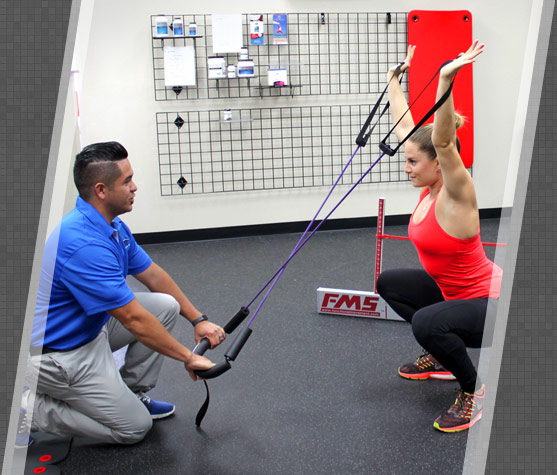Movement Screening / FMS / SFMA / TPI

Perform Better Movement Screening is used to assess the limitations and asymmetries in a patient. We designed this in order to see, and for the patient to see, their movement dysfunctions that are affecting their current conditions and day-to-day activities, and pull out/reveal any problems the patient may not know are affecting them.
Dr. Aaron Ayala utilizes multiple Movement Screenings including Motion Palpation, PRI, Neurokinetic Therapy, Selective Functional Movement Assessment, TPI, Functional Movement Screening, and Controlled Articular Rotations.
A manual procedure that involves a directed Gentle thrust to move a joint past the the physiologic range of motion without exceeding the anatomical limit. Each Chiropractic adjustment uses controlled force, leverage, direction, amplitude, and velocity directed at specific joints or anatomic regions. Manipulation changes the mechanics of the joint and with repetition, establishes correct nerve, muscle, and joint function.
The Selective Functional Movement Assessment (SFMA) is a series of 7 full-body movement tests designed to assess fundamental patterns of movement such as bending and squatting in people who suffer musculoskeletal pain. Dr. Ayala studies the movement of the patient and his moving patterns. This gives him the opportunity to identify meaningful impairments that may be seemingly unrelated to the main musculoskeletal complaint, but contribute to the associated disability. This concept, known as Regional Interdependence, is the hallmark of the SFMA.
The assessment guides the clinician to the most dysfunctional non-painful movement pattern, which is then assessed in detail. This approach is designed to complement the existing exam and serve as a model to efficiently integrate the concepts of posture, muscle balance and the fundamental patterns of movement into musculoskeletal practice. By addressing the most dysfunctional non-painful pattern, the application of targeted interventions (manual therapy and therapeutic exercise) is not adversely affected by pain.
SFMA allows Dr. Ayala to help our patients implementing a new approach – isolating the cause of injury and efficient care.
Modeled after Cyriax’s selective tissue testing, each test of the SFMA is scored as functional / non-painful, dysfunctional / non-painful, functional / painful, or dysfunctional / painful. The goal is to identify the most dysfunctional non-painful movement pattern and break the pattern down to identify the underlying cause of the dysfunction. This includes using traditional muscle length and joint assessment tests which lead to corrective manual therapy and exercise interventions. Emphasis is placed on identifying the most dysfunctional patterns. The model calls for the intervention to be directed only at the non-painful patterns. This ensures that the adverse effects of pain on motor control will not hinder corrective strategies.
The SFMA serves to efficiently integrate the concepts of posture, muscle balance and the fundamental patterns of the movement system into musculoskeletal practice. Additionally, it provides feedback for the effectiveness of the therapeutic exercise program, which targets the dysfunctional movement pattern and related impairments.
The Titlest Performance Institute Certification is an evidence-based, moment-based screening that helps increase player performance, decrease injury and improve mobility through a deep understanding of movement.
In 2014 Dr. Aaron Ayala introduced the Titleist Performance Institute Screening to the golfing community of Ventura County, allowing him to identify limitations and asymmetries in a Golf Swing that may be hindering a golfers Game and Quality of Life.
Gentle Chiropractic Adjustment | Active Release Techniques | Mild Hyberbaric Oxygen Therapy | SFMA | FMS | TPI | Functional Range Conditioning | RockTape | Acoustic Shockwave | Deep Laser Therapy | PEMF